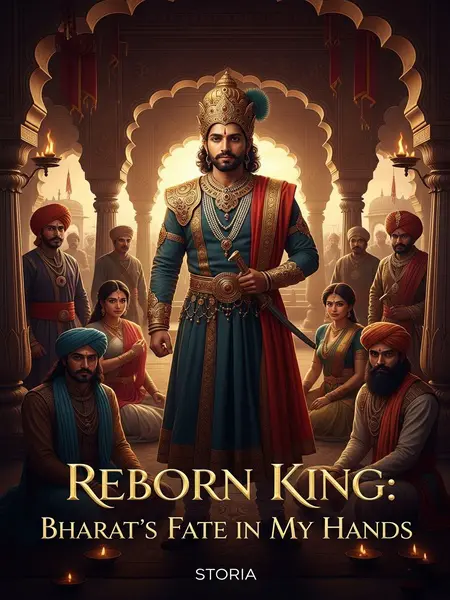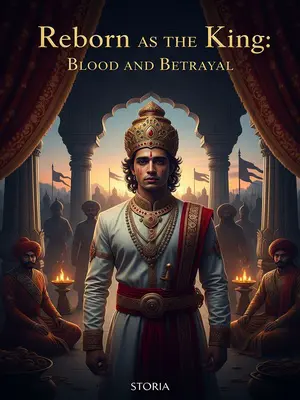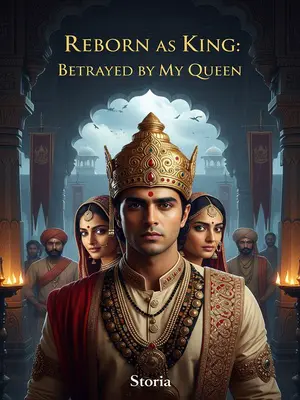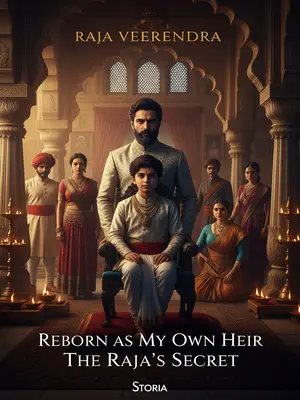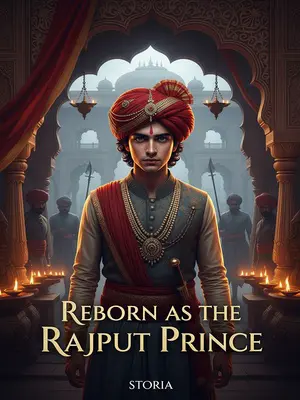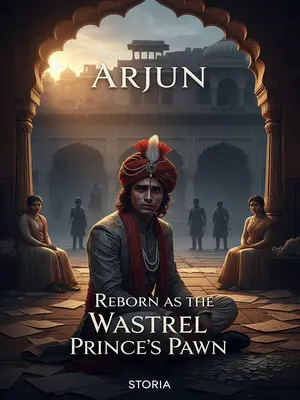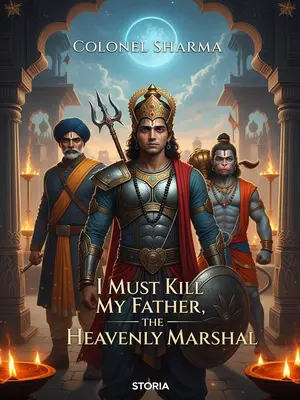Chapter 2: The Prime Minister’s Test
When word arrived that Manoj had camped on the hill, Tanshree’s tents were heavy with the stifling scent of sweat and old leather. The lamp’s flame flickered as the evening wind slipped through the canvas. Outside, the rumble of distant drums and anxious whispers filled the camp, while Chaturvedi’s mind churned with disappointment and fatigue.
At Jaitpur, the high ground was not an advantage; terraced slopes of the Vindhya plateau made charges impossible. Chaturvedi had asked the local farmers many times—their weathered hands tracing the ridgelines in the dust, their warnings clear. Yet ambition and inexperience had overruled caution. Manoj’s eager face haunted him—a boy playing at war with men’s lives.
So he had repeatedly instructed Manoj to camp by the city, near water, to set up camp steadily.
He could still hear his own voice, stern and tired, echoing across the parade ground, issuing orders he knew might not be heeded. The weight of command settled like an old shawl, scratchy and heavy.
Unexpectedly, Manoj was still eager for achievements and insisted on going up the hill to try.
Chaturvedi felt a bitter taste rise in his mouth, half pity, half frustration. He pressed his fingers to his temples, wishing he could roll back the days, do things differently. But history, he knew, gave no such chances.
Chaturvedi closed his eyes.
He took a deep breath, trying to calm the storm within. The sounds of the camp faded, replaced by the memory of his own father’s teachings—wisdom bought at the price of lost battles and sleepless nights.
The efforts of tens of thousands were about to go to waste. The setting sun and evening breeze blew in, stirring Chaturvedi’s grey beard. Down the steps, Ritesh was still asking, “Prime Minister, what should we do now?”
The question hung in the air, raw and desperate. Chaturvedi opened his eyes, meeting Ritesh’s gaze. He saw in the young man’s face both trust and fear, and something of his own lost youth.
Chaturvedi opened his eyes. At first, his voice was low, but by the latter half, it swelled with passion, as if always full of confidence in future victory:
He straightened his spine, summoning the old fire. “Rally the army, summon as many troops as possible, and immediately head to Jaitpur,” he declared. The command crackled through the camp, stirring men from despair.
“Rally the army, summon as many troops as possible, and immediately head to Jaitpur.”
Ritesh folded his hands in a quick namaskar before hurrying off. Around them, men scrambled into action, the scent of hope rising alongside the dust of departure.
Yet perhaps Chaturvedi knew in his heart—it was already too late.
He watched the sky darken, the first stars peeking through the twilight haze. In his heart, a heaviness settled—a knowledge that fate had slipped beyond his grasp, that prayers alone would not mend what was broken.
Three days later, Chaturvedi’s main army had not yet reached Jaitpur when news came that Manoj had been defeated—not just defeated, but had abandoned the main army and fled alone, causing the loss of tens of thousands of young men from Kaveripur who had answered the call to revive Bharat.
The news hit like a monsoon downpour—sudden, shattering, merciless. Mothers would weep, widows would light lamps for men who would never return. Chaturvedi gripped the report, his knuckles white, the paper crumpling beneath his hand. Chaturvedi felt his heart sink, like the last diya flickering out on a stormy night.
The wind howled. Chaturvedi thought: This is all my fault alone.
He closed his eyes, shame burning in his chest. He could hear the voices of the lost—fathers, brothers, sons—calling out in the storm, accusing and forgiving all at once.
With a few more white hairs, Chaturvedi’s thoughts returned to the present: after this defeat, General Singh’s army would soon arrive, and Raghav would surely realise that Dev’s force was just a decoy.
He felt the weight of each added grey strand, the evidence of five years of ceaseless struggle. Every loss seemed etched into his body, a map of pain and perseverance.
Surrounded front and back, he could only retreat.
He looked at the map before him, tracing the lines with a shaking finger. There were no options left, only the bitter taste of retreat. The air grew thick with unspoken grief.
Five years of toil day and night, venturing into wastelands, five years of open and sincere effort, exhausting all his strength—finally, three districts responded, the Gangetic plains were shaken, Malwa was within reach, yet now he must retreat.
He remembered the faces of villagers who greeted him, oil lamps offered at the temple for his success. Five years—now all threatened by a single misjudgment. His heart clenched, but he could not let despair win.
There was no heavy rain at the burning of Shankarpur Valley in history; what ruined the northern campaign was always Manoj’s selfishness, and later, the factional strife of Rajeev.
He thought of history’s cruel jokes, how legends twisted on the winds of ego and division. Even now, the campfires flickered, the men’s voices low with rumor and resentment.
People’s hearts are like knives, whittling Chaturvedi’s figure thinner in the wind.
He felt himself shrinking, worn thin by endless expectations and whispered blame. He wrapped his shawl tighter, but the cold of loneliness crept in.
He sighed and said, “Retreat.”
His voice was soft, almost broken, but it carried the weight of finality. The word passed through the camp like the chill of early winter, freezing hope in its tracks.
Ritesh nodded. Having just joined Kaveripur, he hadn’t yet experienced these five years of hardship, only thinking that with the Prime Minister’s talent, they would surely win back the lost ground sooner or later.
He folded his hands in a quick namaskar before hurrying to pass the order.
A fast horse suddenly galloped from the rear of the formation.
The thunder of hooves cut through the stillness, raising a cloud of dust. The rider’s pagdi flapped in the wind, urgency written in every line. Soldiers scrambled aside, shouting warnings.
It was a Kaveripur scout, so the rear let him into the main camp, but as soon as Chaturvedi saw the scout, his eyes flashed.
Chaturvedi leaned forward, recognizing the colors and insignia. There was a glimmer of hope—or was it dread?—in his eyes, as the rider dismounted and hurried forward.
This man was not from his army.
Chaturvedi’s brow furrowed. He noted the difference in gait, the cut of the uniform, the accent in the man’s hurried words. Something about the messenger’s presence set the old instincts buzzing.
The scout galloped up, dismounted, and knelt. “His Majesty has an edict, asking the Prime Minister not to retreat, but to gather the routed troops at Jaitpur and block General Singh.”
The words came out in a rush, the scout’s forehead touching the dusty ground. Around them, officers craned to listen, eyes widening in disbelief. The wind caught the edge of the royal seal, making it flutter dramatically.
Ritesh frowned—aren’t all military affairs in the Prime Minister’s hands? How, after a defeat, does an imperial edict suddenly arrive?
He shot Chaturvedi a questioning look, the old certainties crumbling. The soldiers muttered among themselves, the name of the king on every tongue.
Unlike Ritesh, Chaturvedi took the edict, not thinking of such intrigues, but carefully checked the royal seal, and pressed it to his forehead, a silent prayer escaping his lips: “Hey Ram, give me strength.” He asked the scout, “Is this truly His Majesty’s will?”
He examined the wax seal, running his thumb along its familiar ridges. The scout’s face was earnest, desperate—Chaturvedi’s heart skipped a beat.
The scout said anxiously, “Absolutely true, Prime Minister. His Majesty—no one knows what came over him—after giving this edict to Attendant Kabir, left Kaveripur and went straight to the camp at Jitpur.”
The words tumbled out, the story strange and incredible. Chaturvedi’s mind raced, trying to piece together the change in the young king. The night air seemed to hum with new energy.
Ritesh’s pupils trembled. I just surrendered, and Kaveripur already has such a huge incident?
He felt the ground shift beneath him, the rules of the old game changing. He looked to Chaturvedi for answers, but found only more questions.
Chaturvedi remained calm. He pointed at the edict and said solemnly, “Since you came from Kaveripur, you must have set out three or four days ago. Three or four days ago, His Majesty already knew Manoj would be defeated?”
The question cut through the confusion, demanding an answer. The officers pressed closer, their faces tense with expectation.
Ritesh was stunned.
He shook his head, unable to comprehend. The idea that the king could foresee defeat—when the rest were blind—was both unsettling and awe-inspiring.
Yes, how could His Majesty have foreseen Manoj’s defeat in advance?
The doubt echoed through the camp, a ripple of fear and wonder. Men exchanged worried glances, whispering about omens and divine intervention.
Kabir had told the scout this, so the scout repeated to Chaturvedi: “His Majesty said Manoj is all talk, eager for achievements, given a chance to command alone, he will never camp honestly under the city, and General Singh is a true master of war—so Jaitpur will surely be lost, and the northern campaign ruined.”
The scout’s voice rose with urgency, carrying the king’s words like a challenge hurled at destiny. For a moment, the camp fell silent, every man listening for the next turn of fate.
Chaturvedi’s face darkened for a moment, then his eyes blazed with new fire.
The old sadness melted away, replaced by something fiercer—a stubborn, unbreakable hope. He stood taller, his shadow stretching long across the ground, as if the years had fallen away.
It was the soaring spirit of one who, after much hardship and whitening hair, finally sees the long wind and breaking waves ahead.
He felt the rush of youth return, the courage that had driven him to risk everything for his people. The gods themselves, he thought, must be watching this moment.
After so many years, Arjun was finally willing to inherit the late king’s will and shoulder the Bharat banner. The child he had watched grow up day by day had finally grown up.
He smiled, a mixture of pride and relief. The dreams of a generation, it seemed, would not be lost after all.
Before Chaturvedi could finish sighing, Ritesh asked again:
“Since His Majesty knows Jaitpur is lost and the northern campaign ruined, why ask the Prime Minister to hold here?”
The question was raw, urgent, carrying the fear and hope of the whole army. Ritesh looked at Chaturvedi, searching for answers in the old man’s eyes.
The scout’s eyes were red with anxiety. “Prime Minister, please write to persuade His Majesty. His Majesty insists there is still a chance to save the northern campaign. As long as General Dev can defeat Raghav at Jitpur and threaten Indraprastha, General Singh will have to withdraw. So His Majesty has gone to Jitpur himself.”
The words trembled in the evening air, carried by dust and wind. The enormity of the king’s gamble pressed on every heart.
Chaturvedi, always calm, swayed. He said, “His Majesty went to Jitpur—to fight Raghav?”
The disbelief cracked his composure, his voice faltering for the first time in years. The men nearby sucked in their breath, shocked by the audacity of it all.
This was not just growing up—this was reaching for the sky.
Chaturvedi, rarely flustered, said, “Didn’t Attendant Kabir or the other ministers tell him that Jitpur is all decoy troops?”
He glanced at the scout, half-hoping for reassurance, half-dreading the answer. The world seemed to teeter on a knife’s edge.
The scout was on the verge of tears. “His Majesty said, as long as he goes, even the decoy troops can become the main force.”
His voice broke, the tears he’d held back spilling at last. The men nearby looked away, unwilling to witness the breaking of a soldier’s heart.
Chaturvedi looked up at the sky, speechless. Besides the howling wind, his mind was blank.
The only sound was the slow whir of the ceiling fan and the distant cry of a hawker selling guavas. The stars blinked above, silent and indifferent. Chaturvedi closed his eyes, whispering a prayer to the gods of his ancestors, asking for wisdom in the darkness.
At this point, Ritesh actually stepped forward. “No one stopped His Majesty? If His Majesty really reaches Jitpur, General Dev might not even join him in this doomed battle, right?”
His voice was harsh, the fear in it raw and desperate. The officers shifted uneasily, the prospect of disaster looming larger than ever.
The scout finally burst into tears. “Those who tried to stop His Majesty—before they got within a hundred paces, His Majesty shot their turbans off with arrows. Then he shouted, ‘The Raja is here—whoever blocks me dies!’ He raised the royal seal high above his head, his heroic spirit surpassing even the late king. So no one dared, or wanted, to stop him. I’m not afraid of anything else, but I’m afraid that such a spirited His Majesty, after running for three or four days, will really inspire General Dev to fight to the death, but… but…”
The words ended in a sob, the fear and awe mingling in every syllable. Around him, even the grizzled veterans looked shaken, unsure what the dawn would bring.
The scout choked up, sobbing.
The sound carried far, mingling with the wind, a dirge for all that might be lost—or won—in the coming days.
Ritesh’s expression changed. He turned to Chaturvedi, only to find Chaturvedi had calmed down at some point.
A stillness had settled over the old man, the turmoil replaced by a strange peace. He straightened his shawl, the familiar gesture giving him comfort.
The great wind still blew.
It rattled the banners, whipped the flames of the campfires, and swept away the last shreds of doubt. The gods, it seemed, were listening after all.
But a smile appeared on Chaturvedi’s face. He said to Ritesh, “Actually, His Majesty knows—there’s no need for this edict. As long as I know he has gone to Jitpur and is determined to fight Raghav, I would never withdraw.”
His voice was gentle, certain. In it was the promise of a thousand unspoken oaths, the bond between ruler and minister, forged in years of hardship.
“If His Majesty is still willing to fight to the death, how could we retreat?”
The words echoed, settling in every heart like a seed of hope. Ritesh stood straighter, the fear in his eyes replaced by something harder—resolve.
Ritesh’s eyes focused, his body tensed involuntarily. He said urgently, “But for the sake of the kingdom—”
He could not finish, the protest dying on his lips. The old logic of caution struggled with the wild new promise of change.
“Who is thinking for the kingdom? Is it only what you and I think that counts as ‘for the kingdom’?” Chaturvedi said slowly. “That is not the way of a minister, nor the way to victory. Pass the order: camp on the spot, gather the routed troops, find another place to set up camp, and be sure to pin General Singh’s army at Jaitpur.”
The command rang out, iron in every word. Around them, men moved with new purpose, the air charged with the electricity of belief.
Ritesh folded his hands in agreement.
He bowed, the gesture as old as the land itself. The sound of his sandals on the dusty ground seemed to signal the start of something new.
Turning away, his mind was still in turmoil. He wanted to speak, but stopped. He still didn’t understand how much chance there was for His Majesty to defeat Raghav’s main force with decoy troops, or why the Prime Minister was willing to gamble with His Majesty.
He walked away, questions spinning in his mind, but the certainty in Chaturvedi’s eyes had planted a stubborn hope. Perhaps, he thought, miracles were possible after all.
Perhaps sensing Ritesh’s doubts, Chaturvedi’s voice came riding the wind:
“I know what kind of person His Majesty is. Now that His Majesty is willing to stand up, I believe in His Majesty—just as the late king once believed in me.”
The words lingered in the night, a promise that echoed far beyond the camp. The wind, for a moment, seemed to still, as if bearing the vow to every corner of the waiting world.
